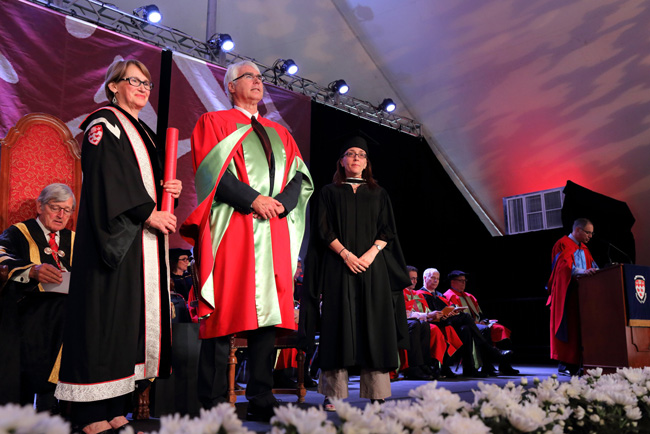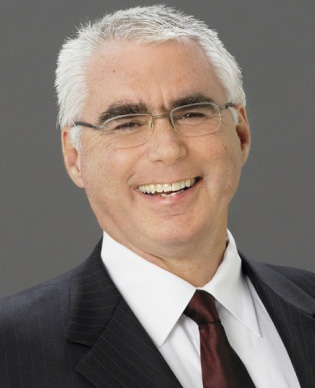
By Neale McDevitt
Established in 2009, the McGill University Medal for Exceptional Academic Achievement is awarded to retired members of McGill’s academic staff who are uniquely deserving in light of their exceptional contributions to their discipline, to the University and to society at large. One of the University’s highest honours, the McGill Medal has only been awarded to five people – Aberto J. Aguayo, Adi Eisenberg and Lawrence Mysak in 2010; Margaret Lock in 2012; and Roderick Macdonald in 2014).
As part of Spring 2016 Convocation, three McGill icons gained admittance to this exclusive club; Donald Taylor, Philip Branton and John Bergeron, featured below).
Recently, McGill’s John Bergeron, one of Canada’s preeminent cell biologists, was invited to be a judge at the Canada-Wide Science Festival (CWSF) – a weeklong event hosted by the University that gathered together 500 of the country’s top young scientists to compete for nearly $1 million in prizes, scholarships and science experiences.
Bergeron jumped at the chance for several reasons. First of all, it gave him the opportunity to meet with some of the people who inspire him the most – young scientists at the very beginning of their respective journeys.
Secondly, it closed a circle over 50 years in the making. “The CWSF started my career at McGill,” says Bergeron. “In 1961, I won the Science Fair at the University of Montreal and that paid for my first year of McGill.”

Although more than five decades have passed since Bergeron graduated with honours in biochemistry, one can still hear the awe in Bergeron’s voice when he talks about those early years. “Back then McGill was much smaller so you knew everyone,” he says. “It was an incredible time because everyone – students and professors – were outstanding. God, they were smart.”
It was a pattern that repeated itself wherever Bergeron’s career brought him – be it at Oxford where he completed a Rhodes scholarship; Rockerfeller University where he earned a postdoctoral fellowship; or as a researcher in Mill Hill, London. “I’ve been so fortunate because, in that every stop along the way, I’ve been surrounded by outstanding professors, colleagues, students and trainees,” including a half dozen Nobel Prize winners.
“When you are immersed in that kind of atmosphere, it is impossible not to be inspired every day,” he says. “It drives you forward and pushes you to be better.”
So inspired, Bergeron would go on to earn international recognition for his break-through work in the fields of molecular biology and proteins.
In 1971, Bergeron was enticed back to McGill by C.P. Leblond, a giant in the field of cell and tissue biology. Once again, Bergeron was awed by the talented people around him. “Charles LeBlond is one of my real heroes, and I was the last person he recruited, so that was a real thrill,” said Bergeron. “And I started working with Barry Posner [with whom Bergeron collaborated with for many years], who really is the smartest person I know on this planet.”
Looking back at those heady days, Bergeron feels privileged to be part of a period of incredible scientific growth fully supported by government and funding agencies. “I was part of that fortunate generation that was able to get all the research grants we wanted. Everywhere you looked there was opportunity,” he said. “There has never been an experiment that I have dreamt of doing that I couldn’t do because of a lack of finances. I don’t think that would be true today.”
Bergeron worries that less funding will hamstring the efforts and enthusiasm of today’s brightest scientific minds. “It is the youth that holds the future for all of us. The future of all institutes of scientific enquiry rest firmly in the hands of talented, young researchers,” he says. “Talent is boldness and boldness means that you build on the strengths of what previous generations have done but you’re not afraid to challenge existing beliefs and to run with your instincts.
“I don’t want to alienate my older colleagues but they made their most important discoveries when they were young. Phil Gold discovered CEA when he was 29. Frederick Banting won the Nobel Prize when he was 32. Barry Posner and I when we were much younger when we made observations that challenged the existing dogma,” says Bergeron. “Only young people make discoveries.”
A renowned researcher, Bergeron also made a name for himself as a builder. Bergeron was one of the key players in the establishment of the Genome Centre and was instrumental in establishing the Department of Anatomy and Cell Biology, serving as its Chair from 1996 to 2009. He also helped plan and secure the grants for the establishment of the Research Insitute of the McGill University Health Centre.
As is his wont, when asked to single out select career highlights, Bergeron inevitably brings the conversation back to the people with whom he has worked. “I’m proudest of the colleagues with whom I’ve been associated, who I’ve helped train and with whom I’ve shared some great moments,” he says. “I’m just very proud to have participated in this whole great endeavor.”
Read the profile on, Philip Branton, one of this year’s other winners of the McGill Medal.
Read the profile on, Donald Taylor, one of this year’s other winners of the McGill Medal.
